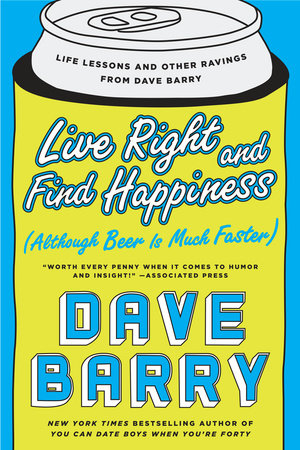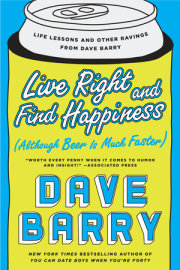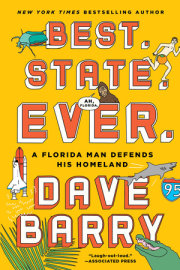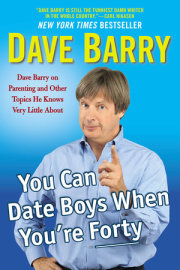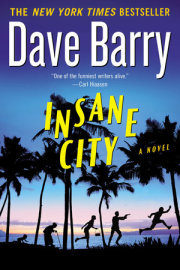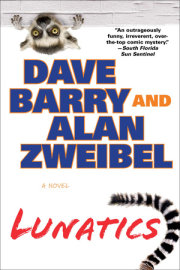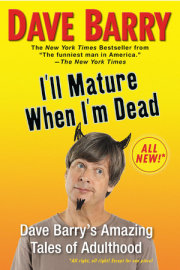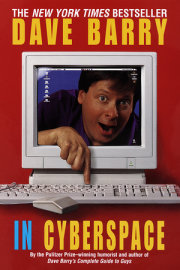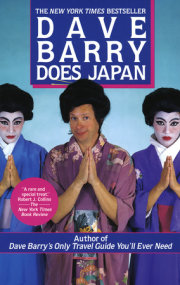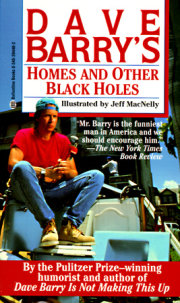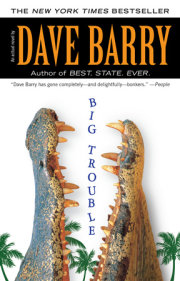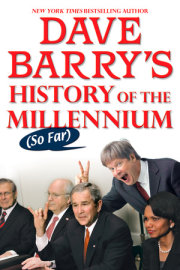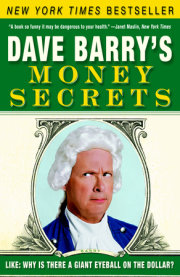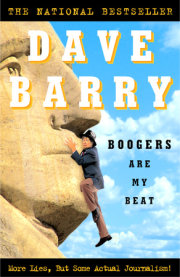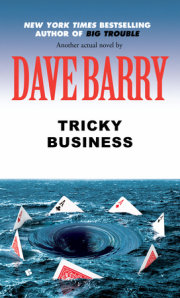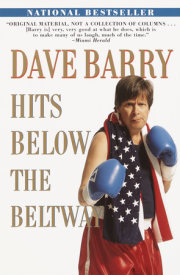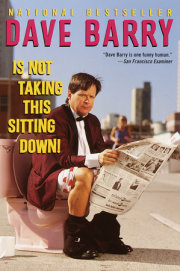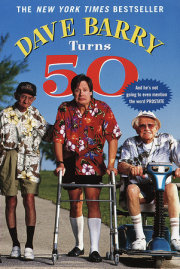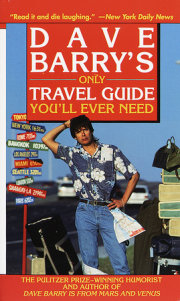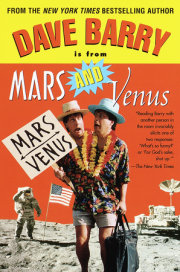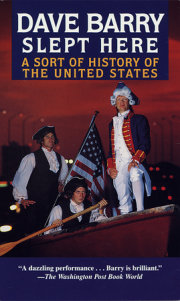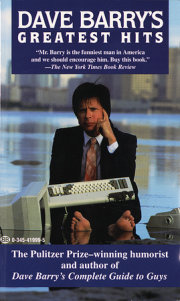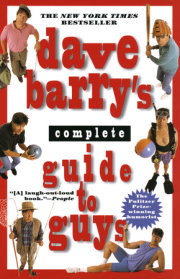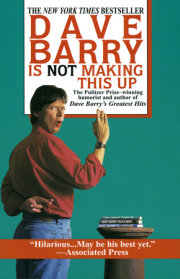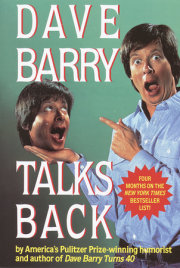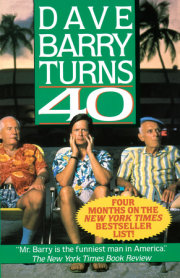INTRODUCTION
What makes us happy?
It’s definitely not money. To quote the old saying that old people are always saying: “Money can’t buy happiness.”
How very true that is.
Oh, you might think money would make you happy. But would it really? Let’s say you inherited a billion dollars. You could have a private jet, live in a mansion with a swimming pool, drive a Maserati. You could drive your Maserati into your swimming pool if you felt like it. That’s how rich you’d be.
But would all that money really make you happy? Would your family and friends really love you any more?
OK, they probably would, especially if you let them ride in your jet. And if they didn’t love you more, you could afford to have them professionally whacked and get a whole new set of family and friends. People would audition to be your friend. I would be one of these people.
So apparently the old saying is wrong: Money can buy you happiness. The problem is, you need a really large quantity of it. You have to be one of those twenty-three-year-old Internet billionaires that everybody would like to punch in the mouth.
So most of us have to seek happiness in other ways. Tragically, some people turn to drugs or alcohol. This is a big mistake. I realize that the title of this book seems to suggest that you can achieve happiness by drinking beer, but that is of course a joke. Beer is not the answer. Sure, when your problems are getting you down, drinking beer might temporarily improve your mood. But what happens when the beer wears off? You’re right back where you started, still stuck with all the same problems. Sooner or later, you’re going to have to face the harsh truth: You need more beer.
No! Strike that. The harsh truth is that happiness is an elusive thing. I speak from personal experience here. I should be a happy man. I have all the elements of a good life: a loving family, a nice home, a dog that doesn’t pee indoors without a good reason. I have a full head of hair and several original teeth. I have no major health issues that I am aware of, thanks to a rigorous healthcare regimen of never getting within 200 yards of a known healthcare provider. I have a small group of really close male friends with whom I am not in touch because we are males, but I know I can count on them if I ever really need them, assuming they are still alive.
And if all of that isn’t enough, I’ve had a long and rewarding career that consists of being paid to write pretty much any random idiot thing I want. You can put suspenders on a salamander, but it still won’t make waffles. See what I mean? That sentence makes absolutely no sense, but I got paid to write it. It’s printed right here in a published book! Unless you’re a high-ranking federal official, there is no way you can do anything this useless and still have a job.
So I have been blessed with many blessings. I should be happy. And I am, sort of. But I can’t escape the nagging feeling that I’m not really happy, at least not the way I was when I was young and carefree and basically an idiot.
I especially have this feeling when it’s my turn to drive the soccer practice car pool for my daughter, Sophie, and some of her teammates. This involves spending up to an hour in a confined space with a group of fourteen- and fifteen-year-old girls, all high school freshmen, listening to them discuss the concerns that girls of that age have, such as racism, bullying and global climate change.
I am of course kidding. Here are the top ten concerns of my daughter and her friends, based on their car pool conversations:
• Boys.
• The hideous totally unwarranted cruelty of high school teachers.
• What this one boy did in this one class OMG.
• Some video on some Internet thing that is HILARIOUS.
• Hair.
6-10. Boys.
All of the girls discuss all of these topics simultaneously at high volume while at the same time (they are excellent multi-taskers) thumbing away on their phones and listening to the radio, which is cranked way up so they can hear it over the noise they’re making.
So they’re very loud. They’re spooking cattle as far away as Scotland. But here’s the thing: It’s a happy noise. These girls are the happiest people I know. Everything makes them laugh. They love everything, except the things they hate, and they love hating those things. They literally cannot contain their happiness: It explodes from them constantly in shrieks and shouts, enveloping them in a loud cloud of pure joy. It gets even louder when the radio plays their favorite song—which is basically every song—and they all sing joyfully along at the top of their lungs. For example, recently, as I was driving them to practice, the girls—most of these are good Catholic girls who attend Catholic school, where they receive religious instruction—suddenly, in unison, began belting out these lyrics:
My anaconda don’t want none unless you GOT BUNS, HON!
This is the chorus to a song called “Anaconda,” in which a man—Sir Mix-a-Lot—is declaring his fondness for large buttocks on women. The “anaconda” refers to one of his body parts. (Hint: Not his pancreas.)
I know what you’re thinking: Why did I let the girls listen to such an inappropriate song? Why didn’t I change the station? My excuses are:
• It took me a while to figure out that the song was not about an actual anaconda.
• If I changed the station, odds are that the new station would also be playing “Anaconda,” or another song that was just as inappropriate. As far as I can tell from driving the car pool, all radio stations play the same two inappropriate songs in heavy rotation.
• Young people have been listening to inappropriate songs on the radio for centuries, dating back to when I was a young person and we listened to “Louie Louie,” which everybody knew had dirty words, although nobody knew exactly what they were:
Louie Louie
[Something unintelligible but supposedly obscene]
Yi yi yi yi!
But getting back to happiness: I envy my daughter and her friends. I wish I could be as happy as they are, although I wouldn’t want to have to go back to high school and deal with acne and the cosine again. I want to be happy AND be a grown-up, if that’s possible. But as I say, happiness is elusive.
Which brings us to this book. It’s a group of essays on a variety of topics. They may seem pretty random, but in fact there’s an underlying theme, which is happiness. There’s an essay about my parents’ generation, which I believe somehow managed to be happier than mine, which was not supposed to happen. There’s a letter to my grandson, imparting wisdom that I hope will enable him to have a happy and fulfilling life, or at least keep him from unnecessarily refrigerating his condiments. There’s an essay on whether adopting modern technology—specifically Google Glass—can bring happiness (SPOILER ALERT: No). There’s an essay on the never-ending funfest that is cable TV news, and one on David Beckham, who makes many people happy, but not me. There are reports on my trips to Brazil, which is basically a happy place, and Russia, which might be, but I had no idea what anybody was saying. There’s some advice for my daughter as she reaches the age when she can legally drive in Florida, which makes her happy, although it terrifies me. And there’s an essay on home ownership, which is the American dream, and a guaranteed way to not achieve happiness.
So that’s the book. I hope you like it. I hope it makes you happy.
If not, there’s always beer.
BITE ME, DAVID BECKHAM
* * *
* * *
I hate David Beckham. To understand why, take a moment to examine the picture below. It’s my yearbook photo from my senior year at Pleasantville (N.Y.) High School, where I was a member of the class of 1965:
This photo has not been retouched. This is what I actually looked like when I was a senior in high school and desperate to be accepted by my peers, or at least not get beaten up by them.
Perhaps you are thinking: “Hey, don’t be so hard on yourself! Back then everybody looked like a dweeb!”
I appreciate your thoughtful effort to console me, but no, not everybody did. Many people back then looked normal; some were actually quite attractive. I was not one of them, as you can clearly see. Remember: This was my high school yearbook photo, which means I was actively trying to look good when it was taken. This was the best I could do.
Part of the problem was simple genetics. I was not a naturally good-looking male. Also I was a late developer puberty-wise. In the photo, I’m looking thoughtfully into the distance, as if I’m thinking: “I wonder what the future holds in store as I prepare to depart from high school and enter the next phase of my life.” In fact I am thinking: “I wonder if I will ever develop body hair.”
Speaking of which: Note my haircut. I appear to be wearing a malnourished weasel on my head. How did I achieve that look? I’ll tell you how: My dad cut my hair. He was a Presbyterian minister. He had received extensive training in theology, but, incredibly, this training did not include a single course in hair design. Also he was bald.
Nevertheless, for years my dad cut my hair, and my brothers’ hair, using electric clippers that he bought at a drugstore. In my opinion it is tragic that our elected officials, who are always making such a fuss about assault rifles, make no effort whatsoever to regulate the sale of electric hair clippers to civilians. In a sane world, my dad would never have been allowed to possess those things. He was a thoughtful, wise and kind man, but he had the hairstyling talents of an enraged barn owl. Consider, for example, this sector of my haircut:
What are we to make of these two strange, vaguely clawlike hair formations on my forehead? It’s not at all clear what their role in the hairstyle is. Are they supposed to belong to the majority of my hair, drifting off to the side? Or are they supposed to be pointing down and forming bangs? Apparently they cannot decide! So they’re just going to loiter there in the middle of my forehead, looking weird. In my high school yearbook photo. Which is the PERMANENT RECORD OF WHAT I LOOKED LIKE IN HIGH SCHOOL.
Not that I am bitter.
Now consider my eyeglasses:
I started wearing glasses in third grade. I was the first kid in my class to need them. I was also one of the smaller kids, which made me the Puny Kid With Glasses, often sensitively referred to by the other kids* as “Four-Eyes.” My mom took me to get my glasses at the optical department of Macy’s in White Plains, N.Y., which offered basically one style of eyeglasses for boys, which should have been called “You Will Die a Virgin.”
Today, 1960s-style eyeglass frames are considered “retro” and are worn ironically by members of the hipster community. Ha-ha! How clever of you, hipsters! Maybe, to complete the “look,” you can also develop a case of retro 1960s-style acne, causing zits the size of hockey pucks to erupt randomly on your face, especially on those rare occasions when you had the opportunity to talk to an actual girl. Wouldn’t that be ironic?!
Not that I am bitter about that, either.
Anyway, my point is that in high school I was not physically attractive to the opposite sex, namely girls.
“But Dave,” I hear you remarking, “looks aren’t everything! There are plenty of other qualities besides cuteness that girls look for in boys.”
Good point! And when I say “Good point!” I mean you are a stupid idiot. The girls of Pleasantville High School were not interested in “plenty of other qualities besides cuteness.” I know this because I HAD plenty of other qualities besides cuteness. Sarcasm, for example. I had a black belt in sarcasm. I went entire years without ever saying anything that was not basically the opposite of what I actually thought. Also I could make realistic farting sounds with my hands. These are just two of the many qualities other than cuteness I had in high school. None of them impressed girls. You will never hear a high school girl say about a boy, in a dreamy voice, “He’s so sarcastic!”
Here is an actual thing that happened to me in eleventh grade:
. All rights reserved. No part of this excerpt may be reproduced or reprinted without permission in writing from the publisher.

